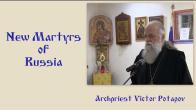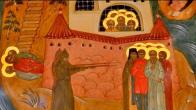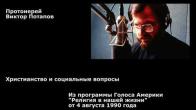You are here
St. Photius, patriarch of Constantinople
6/19 February
St.Photius lived in the 9th Century. He was the child of zealous Christians; his father endured a martyr’s death in defense of icons. St. Photius received an excellent education, and, related to the Imperial Family, held the post of first government secretary in the senate. His contemporaries said of him “he so excelled in knowledge, in almost all spheres of secular learning, that he could truly be considered the glory of his age; he could even have disputed with the ancients.” He was the tutor of both Michael, young heir to the Imperial Throne, and Equal-to-the-Apostles Kyrill, future enlightener of the Slavs. Photius’ profound Christian piety protected him from the allures of life at court. To the depths of his soul, he was drawn to the monastic life.
In 857, Varda, Michael’s co-emperor, deposed Patriarch Ignatius from the Patriarchal throne of Constantinople. Aware of the piety and the breadth of learning possessed by Photius, the bishops pointed him out to the emperor as one worthy of being ruling hierarch. St. Photius humbly accepted the office. He was moved through the successive clerical steps [i.e. reader, subdeacon, deacon, priest – ed.] over the course of 6 days, and on the day of the Nativity of Christ, was consecrated a bishop and elevated to the Patriarchal Throne.
However, soon troubles brought on by Ignatius’ removal from the Patriarchal Throne developed. A Council convened in 861 to deal with those troubles confirmed Ignatius’ deposition and Photius’ election as Patriarch. Pope Nicholas I, whose emissaries attended that Council, had hoped that by confirming that Photius as Patriarch, he would bring Photius under his sway. Failing to achieve that result, he subsequently announced at a council in Rome that Photius was anathema.
From that point, and to the end of his life, St. Photius had to do battle with papal exercise of self-will and attempts to encroach upon the Eastern Orthodox Church. In 864, the people of Bulgarian freely converted to Christianity. It is said that Boris, Prince of Bulgaria was baptized by Patriarch Photius himself, that subsequently Holy Hierarch Photius dispatched an archbishop and priests to Bulgaria to baptize the Bulgarian people, and that in 865, he sent Sts. Kyrill and Methodius to preach Christ in the Slavonic language.
At the same time, adherents of the pope aroused distrust among the Bulgarian people toward the missionaries of the Eastern Church. Bulgaria’s impoverished condition, the result of attacks by the Germans, forced them to seek help from the West, and the Prince of Bulgaria requested the Pope to send him bishops. Upon their arrival in Bulgaria, the papal legates immediately began to supplant Orthodox customs and teachings with their own Latin ones. Holy Hierarch Photius, a staunch defender of the Truth and denouncer of untruth, issued an encyclical advising the Eastern Church of the Pope’s actions and pointing out the Roman Church’s departure from the ancient Orthodoxy, not only in terms of ritual but in terms of confession of faith. A Council was convened, and condemned the self-willed action of the West.
In 867, Basil of Macedonia killed Emperor Michael and seized the Imperial Throne. St. Photius condemned the murderer and forbade him from receiving Holy Communion. For this, he was removed from the Patriarchal Throne, and put under guard in a monastery. Ignatius was reinstated as Patriarch. The Council convened to consider Holy Hierarch Photius’ actions included papal delegates, who demanded of the Council a written declaration of the Church’s unconditional obedience to the judgment of the Pope. The Eastern bishops did not agree, and began to argue with the legates. Called to testify, St. Photius, responded to all of the delegates’ questions with silence. He responded only to the question of whether he was prepared to repent, by asking “And have the judges themselves thought better of it?” After lengthy argument, St. Photius’ opponents prevailed, and without any basis for their judgment, pronounced anathema over Patriarch Photius and all of the bishops who had defended him. The Holy Hierarch was incarcerated for 7 years, and as he himself said, “only gave thanks unto the Lord, patiently enduring His judgment…”
It was during this period that because of the willfulness of the Pope, the Latin clergy were driven from Bulgaria, and were replaced by bishops sent by Patriarch Ignatius. After the death of Patriarch Ignatius in 879, another Council (called by many of the Fathers of the Church the 8th Ecumenical Council), once again recognized Holy Hierarch Photius as lawful Pastor of the Church. Pope John, who knew Photius personally, announced through his emissaries that all of the previous papal decrees regarding Photius were rescinded.
The Council affirmed the inviolability of the Nicene-Constantinopolitan Creed, rejected the Latin innovation (the filioque), and recognized the independence and equality of the two thrones and two Churches, East and West. The Council decreed that in Bulgaria, he church practices and rites introduced by the Latins there would be discontinued, thereby putting an end to Latin power in that land.
During the reign of Basil’s successor Leo, St. Photius again suffered as the result of a false accusation, to the effect that he had plotted against the emperor. Removed from the cathedra in 886, the Holy Hierarch ended his days in 891 in the Armonia Monastery.
The Orthodox Church reveres St. Photius as a zealous defender of the Orthodox East against papal rule, and as a learned Theologian who left us a wide variety of works denouncing the errors of the Latins, rebutting various heresies, explaining Divine Scripture, and elucidating various subjects of the Faith.
Address of our Cathedral
Subscribe to our mailing list
While all the materials on this site are copyrighted, you may use them freely as long as you treat them
with respect and provide attribution on the Russian Orthodox Cathedral of St.John the Baptist of Washington DC.









